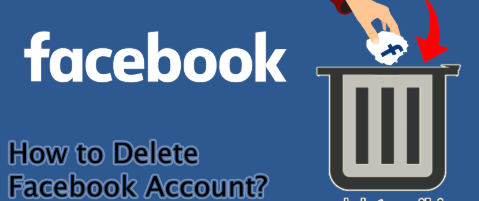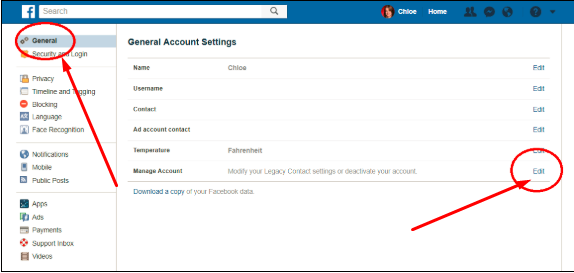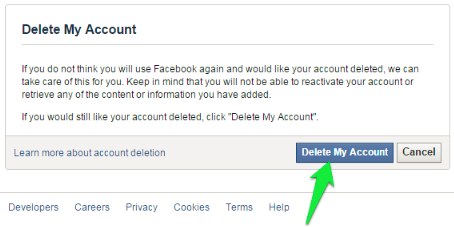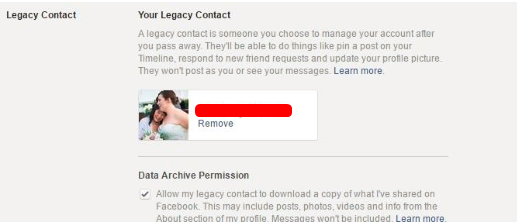How Delete Facebook Account
By
Anjih Najxu
—
Feb 8, 2019
—
Deleting Facebook Account
Recent events might have you considering a break from Facebook. That's not an option for everyone; because situation, simply tighten up your account settings. How Delete Facebook Account: But if having your data extracted for political purposes without your approval sketches you out, there are ways to extricate on your own from the enormous social network.

If you're ready for a social media break, below's the best ways to remove Facebook.
Deactivating
Facebook provides you two options: two choices: deactivate or erase
The first could not be less complicated. On the desktop, click the drop-down menu at the top-right of your screen and also pick settings. Click General on the top left, Edit beside "Manage Account" Scroll down and also you'll see a "Deactivate My Account" web link near the bottom. (Right here's the direct link to utilize while visited.).
If you're on your smart phone, such as making use of Facebook for iOS, similarly most likely to settings > Account settings > General > Manage Account > Deactivate.

Facebook doesn't take this lightly - it'll do whatever it can to keep you about, consisting of psychological blackmail about how much your friends will certainly miss you.
Therefore, "Deactivation" is not the same as leaving Facebook. Yes, your timeline will certainly vanish, you will not have access to the website or your account via mobile applications, friends can't publish or contact you, and you'll shed accessibility to all those third-party services that make use of (or require) Facebook for login. Yet Facebook does not erase the account. Why? So you can reactivate it later.
Just if expected re-activation isn't really in your future, you ought to download a copy of all your data on Facebook - posts, pictures, videos, chats, and so on-- from the settings menu (under "General"). Exactly what you locate could surprise you, as our Neil Rubenking learnt.
Account Removal

To fully delete your Facebook account forever and ever, most likely to the Remove My Account web page at https://www.facebook.com/help/delete_account. Just be aware that, per the Facebook data use policy "after you remove info from your profile or remove your account, copies of that information might remain viewable in other places to the extent it has been shared with others, it was otherwise dispersed pursuant to your personal privacy settings, or it was replicated or saved by various other individuals.".
Translation: if you composed a discuss a pal's standing upgrade or photo, it will certainly stay after you erase your very own profile. A few of your posts and also photos could hang around for as long as 90 days after deletion, also, however simply on Facebook servers, not survive the website.
Deletion on Behalf of Others
If you wish to inform Facebook about an individual you recognize is under 13, you can report the account, you narc. If Facebook can "fairly verify" the account is used by someone underage-- Facebook prohibits kids under 13 to adhere to federal law-- it will certainly remove the account immediately, without notifying anybody.
There's a different form to demand removal of accounts for people that are clinically incapacitated as well as therefore unable to utilize Facebook. For this to work, the requester has to verify they are the guardian of the individual concerned (such as by power of attorney) along with offer an official note from a doctor or clinical center that define the incapacitation. Edit any type of information essential to maintain some privacy, such as medical account numbers, addresses, etc.
If an individual has passed away, a legacy get in touch with-- a Facebook friend or family member who was assigned by the account owner prior to they died-- could obtain accessibility to that person's timeline, when authorized by Facebook. The legacy contact could should supply a link to an obituary or various other documentation such as a fatality certificate. Facebook will certainly "hallow" the web page so the deceased timeline resides on (under control of the heritage contact, who can't post as you), or if liked, remove it.

Mark a particular tradition contact person to handle your account after your passing away. You can find that under settings > General > Manage Account > Your Legacy Contact. When you set one up, you'll get a notice yearly from Facebook to double check that the get in touch with ought to stay the same, unless you opt out of that. You could likewise take the additional step of making certain that after you die, if the heritage get in touch with does report you to Facebook as deceased, your account gets deleted (even if the heritage contact wants the timeline to be memorialized).

If you're ready for a social media break, below's the best ways to remove Facebook.
How Delete Facebook Account
Deactivating
Facebook provides you two options: two choices: deactivate or erase
The first could not be less complicated. On the desktop, click the drop-down menu at the top-right of your screen and also pick settings. Click General on the top left, Edit beside "Manage Account" Scroll down and also you'll see a "Deactivate My Account" web link near the bottom. (Right here's the direct link to utilize while visited.).
If you're on your smart phone, such as making use of Facebook for iOS, similarly most likely to settings > Account settings > General > Manage Account > Deactivate.

Facebook doesn't take this lightly - it'll do whatever it can to keep you about, consisting of psychological blackmail about how much your friends will certainly miss you.
Therefore, "Deactivation" is not the same as leaving Facebook. Yes, your timeline will certainly vanish, you will not have access to the website or your account via mobile applications, friends can't publish or contact you, and you'll shed accessibility to all those third-party services that make use of (or require) Facebook for login. Yet Facebook does not erase the account. Why? So you can reactivate it later.
Just if expected re-activation isn't really in your future, you ought to download a copy of all your data on Facebook - posts, pictures, videos, chats, and so on-- from the settings menu (under "General"). Exactly what you locate could surprise you, as our Neil Rubenking learnt.
Account Removal

To fully delete your Facebook account forever and ever, most likely to the Remove My Account web page at https://www.facebook.com/help/delete_account. Just be aware that, per the Facebook data use policy "after you remove info from your profile or remove your account, copies of that information might remain viewable in other places to the extent it has been shared with others, it was otherwise dispersed pursuant to your personal privacy settings, or it was replicated or saved by various other individuals.".
Translation: if you composed a discuss a pal's standing upgrade or photo, it will certainly stay after you erase your very own profile. A few of your posts and also photos could hang around for as long as 90 days after deletion, also, however simply on Facebook servers, not survive the website.
Deletion on Behalf of Others
If you wish to inform Facebook about an individual you recognize is under 13, you can report the account, you narc. If Facebook can "fairly verify" the account is used by someone underage-- Facebook prohibits kids under 13 to adhere to federal law-- it will certainly remove the account immediately, without notifying anybody.
There's a different form to demand removal of accounts for people that are clinically incapacitated as well as therefore unable to utilize Facebook. For this to work, the requester has to verify they are the guardian of the individual concerned (such as by power of attorney) along with offer an official note from a doctor or clinical center that define the incapacitation. Edit any type of information essential to maintain some privacy, such as medical account numbers, addresses, etc.
If an individual has passed away, a legacy get in touch with-- a Facebook friend or family member who was assigned by the account owner prior to they died-- could obtain accessibility to that person's timeline, when authorized by Facebook. The legacy contact could should supply a link to an obituary or various other documentation such as a fatality certificate. Facebook will certainly "hallow" the web page so the deceased timeline resides on (under control of the heritage contact, who can't post as you), or if liked, remove it.

Mark a particular tradition contact person to handle your account after your passing away. You can find that under settings > General > Manage Account > Your Legacy Contact. When you set one up, you'll get a notice yearly from Facebook to double check that the get in touch with ought to stay the same, unless you opt out of that. You could likewise take the additional step of making certain that after you die, if the heritage get in touch with does report you to Facebook as deceased, your account gets deleted (even if the heritage contact wants the timeline to be memorialized).




